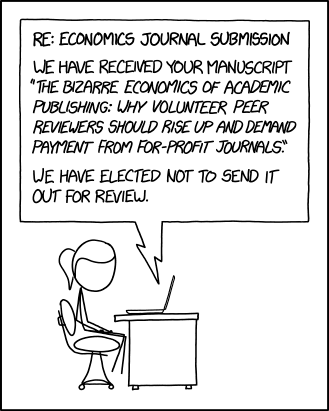2025: Peer Review
Explanation
| |
This explanation may be incomplete or incorrect: Created by a PEER REVIEWER. Needs volunteer commentary on title text. Please change this comment when editing this page. Do NOT delete this tag too soon. If you can address this issue, please edit the page! Thanks. |
How academic publishing works: When a researcher wants to publish their findings, they send it to an academic journal. The editor of the journal is another researcher (usually a college professor), who gets paid nothing or a minimal honorarium for editing the journal. The editor chooses a few (usually three) peer reviewers who are other researchers familiar enough with the study's subfield to judge the study's quality fairly and accurately, and sends it out to them for review. These peer reviewers do not get paid for the work of reviewing the manuscript and offering a detailed critique of every part of the study, from lit review to methodology to conclusions drawn from the results. If the peer reviewers and editor agree that the study was well-conducted and the paper well-written (or just needs minor revisions), it is accepted and published in the journal. The researcher is not paid for getting their paper published in the journal.
In short, nobody in the process is paid for their work except the journal publisher, who charges libraries and individuals for access to the fruit of these people's free labor. This system works on the assumption that all researchers are employed by either companies or universities in positions that require them to publish in order to remain employed or achieve promotions or pay raises. In universities, only postdocs and tenure-track or tenured professors are paid in a way that figures in their research time as well as their teaching time, which means that anyone not in one of those positions (lecturers, educators, adjunct instructors) is not paid for any research they might be doing and publishing, nor are those who are conducting research but cannot get a tenure-track job due to universities replacing tenure lines with non-tenure-track positions.
The title text refers to a recent Twitter post that went viral. The original post asked professionals for the best kept secret in their trade. One researcher responded saying that you could just ask the author to send you a copy rather than pay the fee to the journal and that the author would be delighted to do so free of charge.
Transcript
| |
This transcript is incomplete. Please help editing it! Thanks. |
- [Ponytail is sitting and looking at a laptop.]
- RE: Economics Journal Submission
- We have received your manuscript "The Bizarre Economics of Academic Publishing: Why Volunteer Peer Reviewers Should Rise Up and Demand Payment from For-Profit Journals."
- We have elected not to send it out for review.
Discussion
The title text seems to refer to this tweet from Dr. Holly Witteman, which have since made popular by reddit (/r/YouShouldKnow and /r/lifehacks) Colonelheero (talk) 15:19, 27 July 2018 (UTC)
I can't tell you how many times I was curious about something and had to abandon the quest because the only info I could find was in a journal article and I felt like knowing wasn't worth the cost. Kestrel (talk) 16:38, 27 July 2018 (UTC)
Then there are sites like ResearchGate, where it is encouraged to post supplementary material but you can often find full articles, and you can ask authors for full text (unfortunately often with poor results - sending email would be better, if it is still valid). There are also open-access journals. And there is Sci-Hub. --JakubNarebski (talk) 20:49, 27 July 2018 (UTC)
This site just published a great review of mainstream websites that provide vast swathes of research papers for free: https://citationsy.com/blog/download-research-papers-scientific-articles-free-scihub/ 162.158.62.21 11:45, 28 July 2018 (UTC)
It isn't valid to say people aren't paid to do research. They aren't paid to publish the research, but even graduate assistants do get some pay for their work. Nitpicking (talk) 18:51, 25 July 2022 (UTC)

